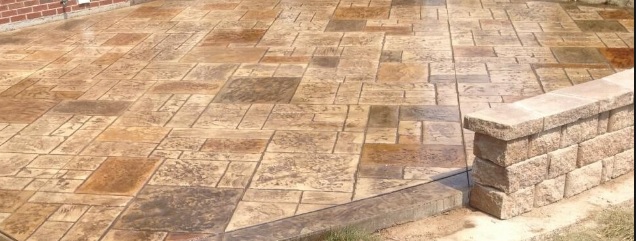There are several differences between water based acrylic concrete sealers and solvent based acrylic concrete sealers. The type of acrylic concrete sealer is best for your application will depend on what you want the concrete to look like once sealed, and how much time you want to invest into repairing and maintain your acrylic sealer.
Acrylic Concrete Sealer Comparison
| Water Based Acrylic Sealers | Solvent Based Acrylic Sealers |
| Won’t darken the concrete | Will darken the concrete |
| Repaired by screen sanding | Repaired with Xylene |
| Requires screen sanding before recoat | No prep required for recoat |
| Can’t add a non slip additive | Can add a non slip additive |
| No VOC | Low VOC |
The two main differences between water based acrylic sealers and solvent based acrylic sealers are the look and level of maintenance.
- Appearance: Water based acrylic sealers will provide a low to high gloss finish without darkening the surface of the concrete, while solvent based acrylic sealers will provide a low to high gloss finish AND darken the surface of the concrete. Solvent based acrylic sealers are used to achieve a true wet look finish.
- Repair: If a water based acrylic sealer delaminates or blushes, the surface will need to be screen-scuffed and in severe cases, the sealer will need to be removed. If a solvent based acrylic sealer delaminates or blushes, you can simply use Xylene to repair the damaged area.
- Re-Coat: When it comes time to recoat a water based acrylic sealer you will need to screen-scuff the entire surface to make sure the new acrylic sealer is able to properly bond to the old one. When it comes time to recoat a solvent based acrylic sealer you simply put more acrylic sealer down to a clean and dry surface.
So which type of acrylic concrete sealer is best? It really comes down to preference.
- Do you want to darken the surface to make it look wet? If yes, then you want a solvent based acrylic sealer and if no then you want a water based acrylic sealer.
- Do you want to screen sand the surface every 1-2 years when it comes time to recoat? If you don’t mind, then either is fine. If you don’t want to then you want a solvent based acrylic sealer.
- Do you need a non-slip additive? If no, you could use either but if you want a non-slip additive then you need a solvent based acrylic sealer.
- Do you want a color? If you want it in clear, you could use either but if you want a color then you need a solvent based acrylic sealer.
- Are fumes an issue? If you need a sealer with little to no smell then you want a water based acrylic sealer and if fumes don’t bother you while the acrylic is drying then you can use either.
Best Acrylic Sealer Reviews
Water based acrylic sealer reviews:
- Seal-Krete Clear Seal Acrylic Sealer (average 4 star review)
- Armor WB25 Acrylic Sealer (average 4.9 star review)
Solvent based acrylic sealer reviews:
- Eagle High Gloss Sealer (average 4.6 star review)
- Armor AR350 Wet Look Sealer (average 4.8 star review)
- Armor AR500 High Gloss Sealer (average 4.9 star review)
- Enduraseal SB Acrylic Sealer (average 4.5 star review)

